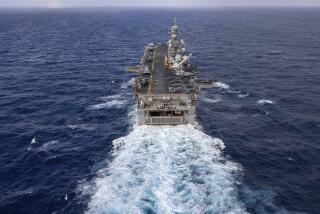Smaller U.S. Force in Turkey Weighed
- Share via
WASHINGTON — WASHINGTON -- U.S. and Turkish officials, struggling to resolve one of the trickiest diplomatic problems facing a military campaign against Iraq, are considering scaling back the size of a U.S. ground force that could be sent through Turkey to attack President Saddam Hussein’s army from the north.
U.S. officials have been pressuring the Turkish government for weeks to allow U.S. commanders to send a contingent of as many as 80,000 ground troops through the southeastern part of the country.
The newly elected Turkish government, facing overwhelming public opposition to a war against Baghdad, has balked at permitting a deployment that would be highly visible and thus politically risky.
In recent days, however, discussions have shifted to the use of smaller contingents, a defense official said Thursday.
The official said no agreement on the figures could be reached before Air Force Gen. Richard B. Myers, chairman of the Joint Chiefs of Staff, flies to Turkey on Monday for talks with his counterparts.
Turkish newspapers reported this week that the two sides had been discussing scaling back the contingent to 15,000 troops.
The Pentagon is eager to mount a ground force to attack Baghdad from the north, to complement the larger force that it is planning to send through southern Iraq in the event of war. By opening a second front, the U.S. would force Hussein to divide his forces.
Military experts say opening a second front could shorten a war by weeks and substantially reduce casualties.
Michael G. Vickers, a defense analyst at the Center for Strategic and Budgetary Assessments, a Washington defense think tank, said he believed that a force of 15,000 could be sufficiently strong to open such a front.
Anthony Cordesman, an expert on Iraq at the Center for Strategic and International Studies in Washington, said the Pentagon has been considering sending troops streaming through Turkey into Iraq from locations in the Mediterranean. This approach, by reducing the number of troops in Turkey at a given time, would theoretically help reduce the public’s objections.
The issue of ground troops has put a rare strain on the U.S.-Turkish alliance.
For half a century, the two countries have had few disputes, and relations between their militaries have been unusually harmonious. Many Turkish leaders believe that the United States is key to advancing the country’s economic development and helping it join the European Union.
But Turkey is struggling with a shaky economy, and the public fears that a war would cost the country billions, as it claims the 1991 Persian Gulf War did.
The new Turkish government has been trying in recent days to demonstrate its commitment to peace by talking with Syria, Jordan, Egypt, Iran and Saudi Arabia.
Turkey has invited the leaders of each to Istanbul next week to make a joint declaration on a path to peace.
The Turks have indicated that they would probably allow the U.S. forces to use air bases and ports. After weeks of delay, a U.S. team is midway through a survey of Turkish airports, ports and military bases.
The team is deciding what improvements will be needed to accommodate American forces if Turkey, a fellow North Atlantic Treaty Organization member, authorizes their arrival.
More to Read
Sign up for Essential California
The most important California stories and recommendations in your inbox every morning.
You may occasionally receive promotional content from the Los Angeles Times.











